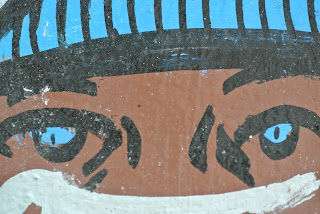For years now, I've read Sherman Alexie's poetry collections and novels. I've always enjoyed the edge of fiction/nonfiction he skirts, willingly and openly, in all his writing. But his brand new memoir, You Don't Have to Say You Love Me, is the first time I've read non-fiction by him, even though he has written many articles and essays.
It was suggested to me to listen to his memoir rather than read it, because he narrates it, in a loving and living way. However, I found after a few chapters I also wanted to be able to read it. I could just tell he was also writing in poetry, and I wanted to see it on the page. I also wanted to be able to quote passages like this:
My little sister doesn’t remember that photograph. She doubts it exists. “You’re always making up stuff from the past,” she said. “And the stuff you imagine is always better than the stuff that actually happened.”
“That’s just a fancy way of calling me a liar,” I said.
“If the moccasin fits, then wear it,” she said.He has imaginary conversations with friends in his head about whether or not he made up a quote he wants to use in the memoir. He continually questions the past, memory, authorship - taking us way beyond "unreliable narrator" and deep into the territory of the mind. I love it.
I don’t recall the moment when I officially became a storyteller—a talented liar—but here I must quote Simon Ortiz, the Acoma Pueblo writer, who said, “Listen. If it’s fiction, then it better be true.”
Simon, a beautiful storyteller, doesn’t remember ever saying such a thing. “That sounds like something I might say,” he said to me. “But I don’t know if I have ever said that particular thing.” I don’t remember when I first learned of the quote. Did I read it in one of Simon’s poems or stories? If so, then why doesn’t Simon remember that he wrote it?
Can a writer forget something that he’s written in one of his own books? Yes, of course. I wrote my first novel over two decades ago, and fans often stump me by asking questions about passages that I don’t remember writing. So perhaps I read that quote somewhere else and have mistakenly attributed it to Simon.
(In talking to another teacher in his head about this quote and attribution:)
“So maybe I’m the one who thought it first?” I said. “And I want to honor you and Simon.”
“Well,” Alex said. “Crediting your thoughts to your mentors sounds more like you’re honoring yourself.”
“That’s funny,” I said. “And sad. Is my ego the source of all my deception and self-deception?”
“Perhaps,” Alex said. “Since you’ve just invented this entire conversation about storytelling and truth that you and I never had, and put it in the first chapter of your memoir, then I’m just going to call you the unreliable narrator of your own life.”But it's the poetry. The way the poetry covers a lot of the same territory as the prose but - differently, because that's how poetry rolls. He uses the density and power of poetry and line breaks to tell the truth in direct ways:
At my mother’s funeral...
A cousin said, “Lillian was
Our last connection to the ancient
Stories and songs. Lillian was
Also a mean and foulmouthed
Woman who scolded everybody.
Right now, I bet you Lillian just arrived
In Heaven and is scolding Jesus
For playing the wrong welcoming song.”
We all laughed and laughed
Because, yes, my mother was
Exactly the kind of mortal
Who challenged the Gods.
She was the reservation Medea.
She was the indigenous Antigone.
But just imagine how it felt to be
Her fragile child. I never stopped
Being afraid of her.And not long after, in prose:
And, if she could do it from the afterlife, my mother would schedule a giant powwow on her grave.
“Okay, folks, welcome to the Seventeenth Annual Lillian Alexie Gravesite Powwow. Every song at this powwow will be a Special for Lillian. Every Grand Entry, Owl Dance, Blanket Dance, and Happy Dance will be for Lillian. And, yes, the venerable Prairie Chicken Dance will also be for Lillian. Okay, next drum is the Lillian Alexie Memorial Singers. This song will be an Intertribal. That means everybody gets to dance. Even you white people. Yes, that means all of you white people will also be dancing for Lillian. So, okay, Lillian Alexie Memorial Singers, whenever you’re ready, you can take it away!”The whole memoir is a great exploration of what it is like to grow up with - then survive - a very unstable and powerful mother. It's also a beautiful pastiche of poetry and prose, showing where they overlap and where they serve separate purposes. It's an incredible journey through indigenous life, identity, and North American racism. Finally, it's a fine line exploration about running over the space between sanity and severe mental health challenges through multiple generations.
So many reasons to read it.










 This is a wonderful writing from a student, a response to the prompt "Listening and Sounding" in last week's class. The many layers of listening and speaking, of remembering memories, and of the ways our stories about ourselves change all feel well-handled here. I appreciate her straight-forwardness mixed with wry humor. Thanks for sharing this first draft of direct writing with us, Barbara Samuel.
This is a wonderful writing from a student, a response to the prompt "Listening and Sounding" in last week's class. The many layers of listening and speaking, of remembering memories, and of the ways our stories about ourselves change all feel well-handled here. I appreciate her straight-forwardness mixed with wry humor. Thanks for sharing this first draft of direct writing with us, Barbara Samuel.


